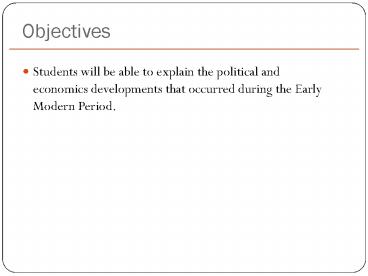Objectives - PowerPoint PPT Presentation
Title:
Objectives
Description:
Impact of World Economy Columbian Exchange New ... of control for Spain, France, and Holland India was a ... 4_Equity Objectives The World Economy ... – PowerPoint PPT presentation
Number of Views:115
Avg rating:3.0/5.0
Title: Objectives
1
Objectives
- Students will be able to explain the political
and economics developments that occurred during
the Early Modern Period.
2
The World Economy (15th 18th Centuries )
3
I. A More Connected World
- The World Economy
- Truly began with European exploration and
conquest of the New World - International exchange of manufactured goods,
foods, diseases, and traditions - Included Atlantic, Pacific, and Indian Oceans
- Extensive use of silver as method of exchange
- A major power shift that placed Europeans
squarely in the center of the world
4
II. European Maritime Dominance
- Europeans initially limited by poor technologies,
fear, and lack of knowledge - Other societies (Vikings, Chinese, Muslims) had
already surpassed Western Europe in establishing
sea trade - Changes
- Wealthy upper class demanded imported goods
- Technological improvements
- Better sailing ships for long distances,hauling
cargo/weapons - Use/improvement of compass
- Maps/mapmaking
- Development of guns/cannons
- Portugal Spain are first to compete for sea
power - Portugal set out to discover new lands/routes to
India, mid-1400s - Financed by Prince Henry the Navigator
5
II. continued
- Spain sought similar goals
- Christopher Columbus thought he had found India
(1492) - Ferdinand Magellan sailed across both the
Atlantic and Pacific, claimed the Philippines
for Spain (1521), first voyage to fully
circumnavigate the globe - Northern Europe
- 16th century England, France, Holland compete
for power - Improvements in boat design (faster, lighter)
help lead Dutch (Holland) to dominance in
Southeast Asia - France and England battle for North America,
South Asia
6
II. continued
- All nations wanted economic gains through the
control of resources and the import/export of
goods - Nations set up trading companies that were not
closely supervised by the home governments - Often acted as independent governments in the
areas in which they operated - Laid foundation for colonial dominance in areas
like North South America, South Southeast
Asia - Examples Dutch East India Co., British East
India Co.
7
III. Impact of World Economy
- Columbian Exchange
- New World foods come to the Old World
- SEE MAP FOR EXAMPLES!
- New crops agricultural improvements pop.
growth in Old World - Old World animals to the New World
- SEE MAP FOR EXAMPLES!
- Disease spread quickly
- Native Americans had no resistance to
Afro-Eurasian diseases (measles, small pox) - More than 50 of native pop. wiped out in 16th
and 17th centuries - Competition among Europeans becomes more
prominent
8
5-Minute Response
- Describe the positive and negative consequences
of the more connected world that appeared in the
late 15th and 16th centuries.
9
IV. Inequality and Imbalance
- Europeans come to dominate overall world trade
- Chinese, Japanese, Muslim empires slowly loose
control/influence - Battle of Lepanto (1571) Spanish defeated
Ottoman Empire, ended any hope of a dominant
Muslim trading empire - European core nations developed many areas of
world become dependent on Europeans - Dependent areas produce low-cost goods (precious
metals, spices, tobacco, etc.) - Core-nations traded or forcefully acquired goods
- Demand for cheap labor leads to slave labor
- China, Japan, and Muslim empires resist European
influence - Limit contact to exchange of weapons technology,
establishment of trading posts
10
V. European Expansion and Colonies
- The establishment of colonies gave Europeans a
firmer grip on many parts of the world - First American colony established by Spain in
Panama, by Vasco de Balboa (1509) - Francisco Pizarro overtook Inca Empire for Spain
- Helped cement control of South America
- Early colonists out for gold
- Gradually develop more structured system based on
agricultural settlements and cheap/forced labor - Spain and Portugal controlled most of Latin
America (Central South America), while France
and England struggled for control of North
America
11
V. Continued
- Africa and Asia
- Europeans deterred by disease and climate,
originally stayed mostly on coasts of Africa,
Asia - Cape Colony established by Dutch (1652) on
southern tip of Africa - Boers (farmers) acted as European pioneers in
Africa - Eventually, began moving towards inland Africa in
search of suitable farmland, resources, and
slaves - Philippine and Indonesian Islands in Asia became
centers of control for Spain, France, and Holland - India was a battleground between France and
England - England would prevail and control India for
centuries
12
VI. Impact on Western Europe
- Economically, Western Europe grew beyond measure
- Began to focus more on manufacturing and
exporting (mercantilism) - Dependence on domestic agriculture began to
lessen - Politically, the growth of the World Economy had
a profound effect on W. Europe - Colonial expansion efforts added to already
existing rivalries and tensions, strengthened
monarchies - British/Dutch v. Spanish
- British v. Dutch
- British v. French
- Seven Years War (1756-1763) was fought in
Europe, India, and N. America - Often called the first world war, ended with
Treaty of Paris
13
5-Minute Response
- In the 16th and 17th centuries, the global
balance of power was tipped. - What does this mean, and to whom did it tip?
- What are some reasons for this tip and what was
the impact?
14
Key Vocabulary Chapter 16
- World Economy
- Cape of Good Hope
- Christopher Columbus
- Ferdinand Magellan
- Dutch East India Company
- British East India Company
- Core Nations
- Mercantilism
- Francisco Pizarro
- Vasco de Balboa
- Seven Years War
- Treaty of Paris (1763)
- Cape Colony
- Boers































